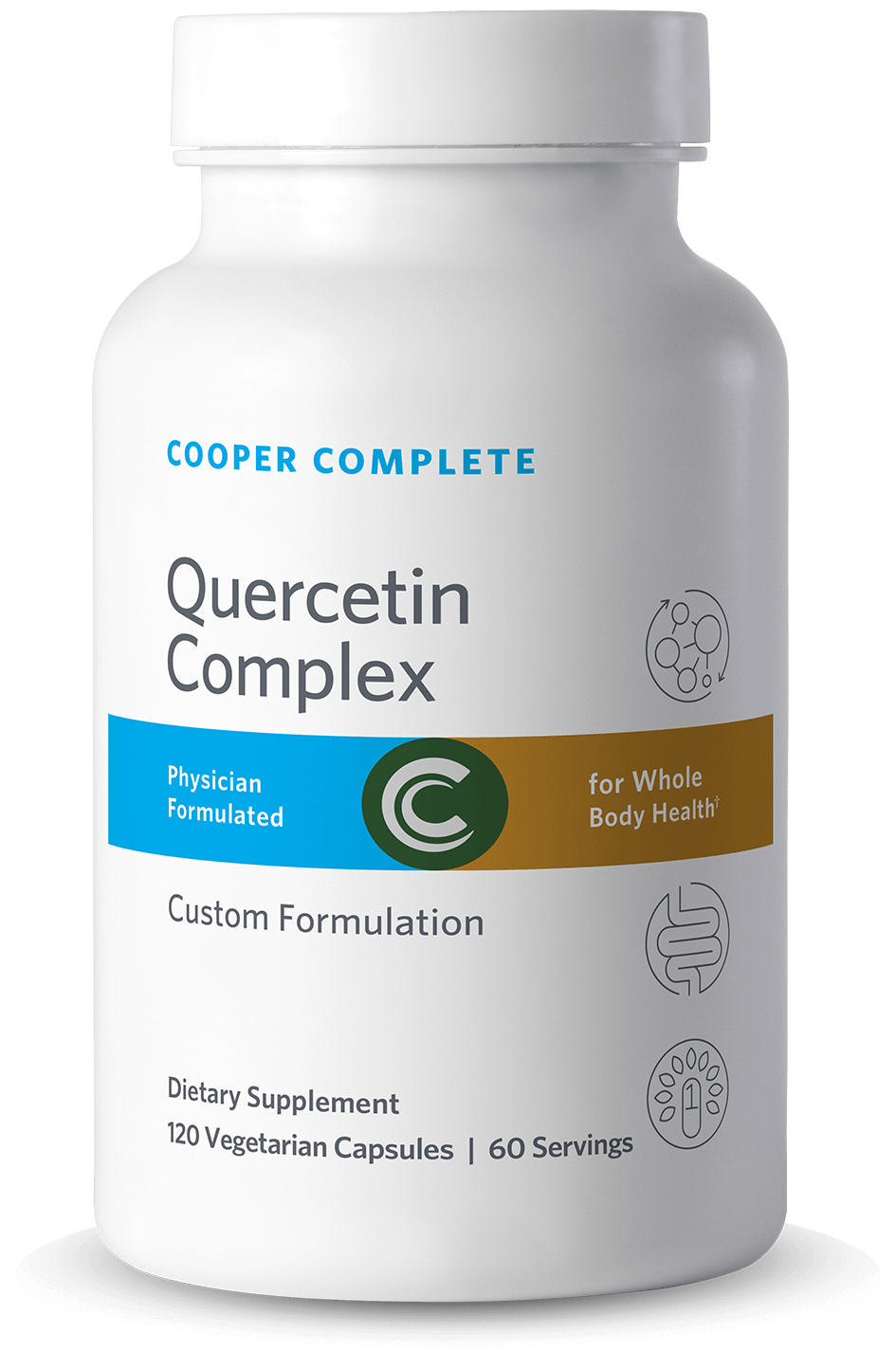Top Quercetin Health Benefits: From Antioxidant Action to Allergy Relief

Quercetin is a powerful plant compound, classified as a flavonoid, found in fruits, vegetables and herbs. It is the most common flavonoid found in foods and is best absorbed when paired with dietary fat. A nutritious diet can provide up to 13 mg of quercetin daily through various food sources, including:
- Apples
- Grapes
- Berries
- Citrus
- Cherries
- Broccoli
- Onions
- Capers
- Green tea
- Coffee
- Red wine
While a healthy diet may provide up to 13 mg of quercetin daily, clinical research shows that concentrated supplemental forms offer significantly higher amounts—making it possible to achieve measurable benefits across immune function†, respiratory health†, exercise recovery†, and more†.
Health Benefits of Quercetin: Immune support†
Flavonoids are well known for their ability to act like antioxidants in the body, protecting cells from free radicals† and inflammation†, both of which can contribute to the onset of chronic disease†. In a study of women with rheumatoid arthritis, the effects of quercetin supplementation on inflammation and disease severity were evaluated. Supplementation with quercetin for eight weeks significantly reduced early morning stiffness†, morning pain† and after-activity pain† in individuals with rheumatoid arthritis†.

Quercetin Complex Supplement
Quercetin, stinging nettles, the digestive enzyme bromelain, N-Acetyl-L-Cysteine, and vitamin C physician formulated to support inhibited histamine response, respiratory, and healthy immune function.†
$36.48 Add to cartOther clinical research on quercetin revealed a reduction in frequency and length of hospitalizations, lower respiratory failure risk, ICU transfers, and even reduce mortality when used in combination with standard care during early-stage viral illness†. In athletes who underwent intense training for two weeks, those taking quercetin had fewer upper respiratory tract infections† compared to a placebo group.
Cooper Clinic Platinum Physician Michael Chapman, MD, shares that quercetin is thought to have direct virucidal properties, meaning it can destroy or inactivate viruses†. “Quercetin is an antioxidant and anti-inflammatory agent, but should be used with caution in patients with hypothyroidism, and thyroid stimulating hormone (TSH) levels should be monitored†.”
Quercetin is also believed to act as a zinc ionophore, helping transport zinc into cells where it supports both innate and adaptive immune responses†.
Antioxidant and Anti-inflammatory Action†
As an antioxidant, quercetin helps neutralize free radicals† and supports long-term cellular health†. It also contributes to the body’s normal inflammatory response, which may help with joint discomfort and respiratory irritation†.
Exercise Recovery†
Quercetin supplementation has also been shown to enhance physical performance and improve muscle recovery†. In one controlled study of healthy triathletes, those who took 250 mg of quercetin phytosome twice daily for 14 days experienced reduced race times and reported less muscular pain†, cramping†, and post-exercise soreness†. They also showed lower oxidative stress levels one hour after their final run, a factor linked to faster recovery†.
Allergy Support†
Quercetin has long been recognized for its role in maintaining sinus and respiratory health†. Studies have shown that it helps support healthy histamine levels and may reduce seasonal allergy symptoms, such as nasal congestion†, sinus pressure†, and sneezing†. This makes it especially helpful for those with allergic rhinitis or mild asthma†.
In a 2019 study, quercetin phytosome supplementation in healthy adults with mild to moderate asthma or rhinitis reduced the frequency of attacks†, lowered their need for inhalers and rescue medications†, and improved overall symptom management†.
Improved Gut Health†
Microbiota play an essential role in metabolic, nutritional, physiological and immunological processes. Research indicates quercetin may benefit digestive health by enhancing gut barrier function†, reducing inflammation†, and supporting a balanced gut microbiome†. While more research is needed, early findings are promising†.
Health Benefits of Quercetin: Blood Pressure Support†
Research also shows quercetin may help improve blood pressure. A meta-analysis of seven clinical trials involving 587 individuals with prehypertension or hypertension found that quercetin supplementation (at doses of 500 mg or more per day) resulted in a reduction in blood pressure.† Average reductions were 4.45 mm Hg systolic and 2.98 mm Hg diastolic.† Cooper Complete Quercetin Complex provides 400 mg of quercetin dihydrate per serving.
Quercetin and Chronic Prostatitis†
The National Institute of Health explains that chronic prostatitis syndromes—inflammation of the prostate—are common disorders with few effective therapies. With prostatitis, men commonly experience chronic pelvic pain. In a study of men with chronic pelvic pain, participants received either a placebo or quercetin twice daily for one month. Those who took the quercetin supplement reported symptom improvement† and reduced pain†. Further research is needed on quercetin’s health benefits for improving prostatitis symptoms†.
Cooper Complete Quercetin Complex
Physician recommended Cooper Complete Quercetin Complex combines 400 mg of quercetin with additional nutrients that work synergistically to support immune health†, respiratory function†, seasonal allergy relief†, and exercise recovery†.
- Stinging Nettle Leaf (400 mg): Helps regulate the immune response† in the airways and nasal passages by moderating inflammatory-related activities such as mast cell degranulation and prostaglandin formation†.
- Bromelain (100 mg): A digestive enzyme that comes from pineapple stems. Historically, bromelain has been used traditionally in Central and South America for digestive disorders†, but is now also known for reducing pain and swelling†, especially in the sinuses†, gums†, and other parts of the body after injury†. Preliminary research has shown that bromelain can aid in reducing nasal swelling† and may assist with sinus and respiratory comfort†. Bromelain also enhances quercetin absorption†.
- N-Acetyl-L-Cysteine (50 mg): An amino acid precursor to glutathione, NAC supports detoxification†, thins mucus for easier airway clearance†, and helps maintain respiratory health†.
- Vitamin C (300 mg): A strong antioxidant that supports immune function† and lowers histamine levels†, especially during stress from illness or exposure to environmental allergens and pollution†
Loading Quercetin for Best Results†
For best results, begin with a loading dose of quercetin†. Take 2 capsules three times a day for 7 to 10 days. This helps build up levels in the body for faster more noticeable benefits†. After this initial period, most people switch to a maintenance dose of 2 capsules per day†. Following this two-phase approach can help the body get the most from quercetin’s immune†, respiratory†, and antioxidant support†.
Final Note
As always, talk with your physician or health care provider before starting any new supplement, especially if you have thyroid conditions, chronic health concerns, or are taking medications†. Quercetin may affect thyroid hormone levels in people with hypothyroidism.†
Cooper Complete June 11, 2025